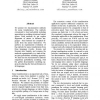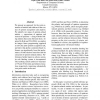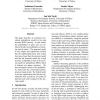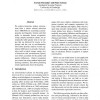81
Voted
EMNLP
2006
15 years 2 months ago
2006
NLP systems for tasks such as question answering and information extraction typically rely on statistical parsers. But the efficacy of such parsers can be surprisingly low, partic...
93
Voted
EMNLP
2006
15 years 2 months ago
2006
The automatic recognition of the rhetorical function of citations in scientific text has many applications, from improvement of impact factor calculations to text summarisation an...
105
Voted
EMNLP
2006
15 years 2 months ago
2006
We present two discriminative methods for name transliteration. The methods correspond to local and global modeling approaches in modeling structured output spaces. Both methods d...
89
Voted
EMNLP
2006
15 years 2 months ago
2006
We present an approach for the joint extraction of entities and relations in the context of opinion recognition and analysis. We identify two types of opinion-related entities -- ...
86
Voted
EMNLP
2006
15 years 2 months ago
2006
Information Extraction (IE) is the task of extracting knowledge from unstructured text. We present a novel unsupervised approach for information extraction based on graph mutual r...
85
Voted
EMNLP
2006
15 years 2 months ago
2006
The end-to-end performance of natural language processing systems for compound tasks, such as question answering and textual entailment, is often hampered by use of a greedy 1-bes...
83
Voted
EMNLP
2006
15 years 2 months ago
2006
This paper describes an extremely lexicalized probabilistic model for fast and accurate HPSG parsing. In this model, the probabilities of parse trees are defined with only the pro...
EMNLP
2006
15 years 2 months ago
2006
Combining fine-grained opinion information to produce opinion summaries is important for sentiment analysis applications. Toward that end, we tackle the problem of source corefere...
71
Voted
EMNLP
2006
15 years 2 months ago
2006
We analyze humorous spoken conversations from a classic comedy television show, FRIENDS, by examining acousticprosodic and linguistic features and their utility in automatic humor...
78
Voted
EMNLP
2006
15 years 2 months ago
2006
We discuss different strategies for smoothing the phrasetable in Statistical MT, and give results over a range of translation settings. We show that any type of smoothing is a bet...




